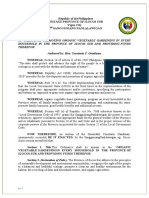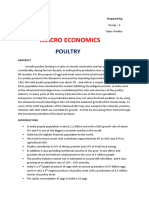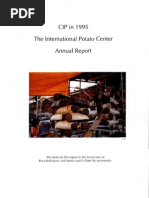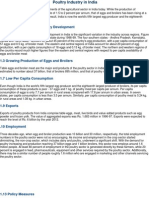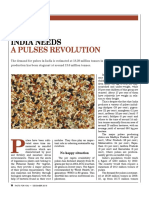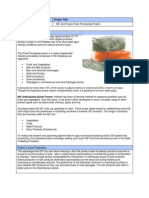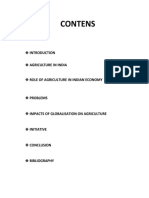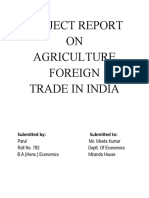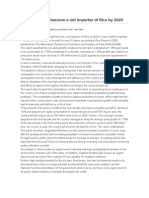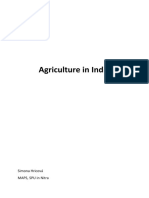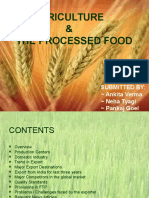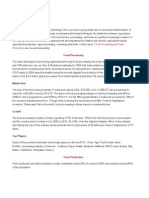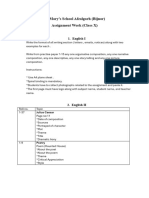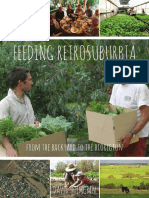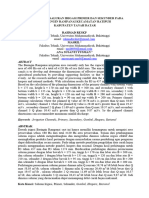0 ratings0% found this document useful (0 votes)
19 viewsSanjeeb Mukherjee Banana: New Delhi, 13 April
Sanjeeb Mukherjee Banana: New Delhi, 13 April
Uploaded by
arpit851) The document discusses 5 Indian agricultural products - mango, banana, potato, soybean, and poultry - that could drive growth in the agriculture sector over the next 20 years.
2) It recommends increasing yields, reducing waste, and building brands to boost exports of these products. This could generate more income for farmers and position India as an agricultural powerhouse.
3) Key strategies proposed include improving irrigation, promoting high-yield varieties, and investing in infrastructure like processing hubs to overcome bottlenecks in each product area.
Copyright:
© All Rights Reserved
Available Formats
Download as PDF, TXT or read online from Scribd
Sanjeeb Mukherjee Banana: New Delhi, 13 April
Sanjeeb Mukherjee Banana: New Delhi, 13 April
Uploaded by
arpit850 ratings0% found this document useful (0 votes)
19 views1 page1) The document discusses 5 Indian agricultural products - mango, banana, potato, soybean, and poultry - that could drive growth in the agriculture sector over the next 20 years.
2) It recommends increasing yields, reducing waste, and building brands to boost exports of these products. This could generate more income for farmers and position India as an agricultural powerhouse.
3) Key strategies proposed include improving irrigation, promoting high-yield varieties, and investing in infrastructure like processing hubs to overcome bottlenecks in each product area.
Original Description:
FARM
Original Title
FARMING 2
Copyright
© © All Rights Reserved
Available Formats
PDF, TXT or read online from Scribd
Share this document
Did you find this document useful?
Is this content inappropriate?
1) The document discusses 5 Indian agricultural products - mango, banana, potato, soybean, and poultry - that could drive growth in the agriculture sector over the next 20 years.
2) It recommends increasing yields, reducing waste, and building brands to boost exports of these products. This could generate more income for farmers and position India as an agricultural powerhouse.
3) Key strategies proposed include improving irrigation, promoting high-yield varieties, and investing in infrastructure like processing hubs to overcome bottlenecks in each product area.
Copyright:
© All Rights Reserved
Available Formats
Download as PDF, TXT or read online from Scribd
Download as pdf or txt
0 ratings0% found this document useful (0 votes)
19 views1 pageSanjeeb Mukherjee Banana: New Delhi, 13 April
Sanjeeb Mukherjee Banana: New Delhi, 13 April
Uploaded by
arpit851) The document discusses 5 Indian agricultural products - mango, banana, potato, soybean, and poultry - that could drive growth in the agriculture sector over the next 20 years.
2) It recommends increasing yields, reducing waste, and building brands to boost exports of these products. This could generate more income for farmers and position India as an agricultural powerhouse.
3) Key strategies proposed include improving irrigation, promoting high-yield varieties, and investing in infrastructure like processing hubs to overcome bottlenecks in each product area.
Copyright:
© All Rights Reserved
Available Formats
Download as PDF, TXT or read online from Scribd
Download as pdf or txt
You are on page 1of 1
Five farm products that can change
India’s agriculture landscape
SANJEEB MUKHERJEE exports, the report said. potato used in processing from the cur- But, India’s soy industry is crippled by
New Delhi, 13 April rent seven per cent to 14 per cent or low yield, limited domestic demand
Banana more. In addition, India could also for soymeal and inadequate irrigation
Mango, banana, potato, soybean and Though India is the world’s largest pro- aspire to export 1.5 million tonnes to facilities for crops.
poultry are the five main farm prod- ducer of bananas, its exports are min- two million tonnes of potato from the The country can overcome these
ucts which could form the bedrock of imal. It exported only 0.37 per cent of current 1.2 million tonnes, to become bottlenecks by doubling yields through
rejuvenation in India’s agriculture and its produce in 2010, but produces one of the top five potato exporters in mechanised sowing and harvesting,
allied activities landscape in the next almost 30 per cent of the world out- the world, especially catering to the improving market access for high
two decades. put, the report said. In 2010, India did Asian countries. yielding seed varieties, and using drip
This can be created by building a not export any banana to Japan and To achieve this, the report said the irrigation in farms. The government
strong brand for these products in the Russia and exported just one tonne to scientific use of fertilisers, use of sprin- on its part can boost consumption by
international markets, reducing China in 2010. However, it has kler or drip irrigation and adequate promoting soya as an integral part of a
wastage by almost half and doubling immense potential. mechanisation to cut costs be adopted. high protein diet, branding soy oil for
the per hectare yields, according to the The real potential for bananas in “For example, costs can be reduced exports.
third Food and Agriculture Integrated India is through branding both in the by using prophylactic pesticides which “Guaranteeing traceability and non-
Development Action Report titled: domestic and export market. India prevent late blight disease in areas with GM usage will ensure that India sus-
‘India as an agriculture and high value could increase total produc- low infestation rates, and tains 20 per cent premium over the GM
food powerhouse: A new vision for tion by 75 per cent to about The five products cost just ~200 a kg, while soyaoils supplied by other countries,”
2030, prepared jointly by CII and 50 million tonnes in 2030 to have been treatment pesticides are the report said.
McKinsey and Company. meet rising domestic selected based on more than 20 times more
The five products have been select- demand and tap the export their crop size and expensive. Sprinkler irriga- Poultry
ed based on their crop size and rele- opportunity. The report also relevance for tion increases yield by 15 to India is currently the third largest pro-
vance for consumers, growers and crop highlighted that India consumers, 25 per cent, and drip irriga- ducer of eggs (by weight) and the sixth
diversity. should aspire to have an effi- growers and crop tion increases yield by 30 largest producer of chicken meat in the
cient, globally competitive diversity to 40 per cent, while saving world. India’s broiler meat production
Mango supply chain and aspire to up to 40 per cent of water,” has grown by a brisk 10 per cent and egg
The report said mango production has export 1.5 million tonnes by 2030, which the report said. It also suggested that production by five per cent over the past
grown consistently at four per cent per is 25 times the current export figure. industry could identify, test and pro- 10 years. By 2030, over 40 per cent of
annum since the past two decades only For farmers, the report said exten- mote new high yielding processing India’s population will be urbanised and
because of increase in area as yields sive tissue culture should be promoted varieties from the available interna- the number of working women is likely
have remained stagnant. To achieve a through private participation, drip irri- tional basket. to double. This could significantly boost
target of 37 per cent increase in per gation should be augmented and impe- A successful example of branding the market for frozen foods, including
hectare yield, reducing wastage by 50 tus provided for export of fresh potatoes is that of Greenvale’s Farm poultry products.
per cent in the next 20 years and bananas. Fresh potatoes in the UK. Launched But, the potential is constrained by
increasing exports 10 times, the report with the USP of better and consistent recurring incidents of disease in poul-
said farmers should be trained to incul- Potato taste and freshness, the effort was a suc- try products, no awareness on frozen
cate best practices to improve yield, India’s domestic consumption of pota- cess, and Greenvale’s potatoes are now foods and rising feed costs. Giving an
enhance farm-gate infrastructure and to increased five per cent per annum available across the UK, the report said. example, the report said that in India,
also build clusters in major growing for the past five years, though the per the frozen meat market is just five per
states of Andhra Pradesh, Uttar capita consumption is still about half of Soybean cent of the total poultry market, while
Pradesh, Karnataka, Bihar and Gujarat. that of China and lags far behind most This is one of the fastest growing crops the world over this is much more. To
The clusters can be built with the western countries. in India with exceptional price reali- achieve its full potential, the report
help of cooperatives. To enhance the India produced more than 40 mil- sations. India currently exports 55 per suggested that government should
image of Indian mangoes worldwide a lion tonnes of potato in 2011, with more cent of its soya meal and Indian prices invest in mega processing hubs,
special brand should be built and than 1.8 million hectares of area under are linked to global prices. increase profitability of poor poultry
export of packaged mango juice should cultivation and yields reaching 20 “India’s soya farmers and industry farmers through back-end feed manu-
be encouraged. A special impetus tonnes per hectare. There is also abun- are ready to unlock an ~45,000 crore facturing technologies and boost mar-
should be provided to fresh mango dant opportunity to double the share of opportunity by 2030,” the report said. ket for frozen foods.
You might also like
- Project Report On Food Processing IndustryDocument40 pagesProject Report On Food Processing Industrysekhar_chandu67% (3)
- Catalogue Career Paths CoursesDocument6 pagesCatalogue Career Paths CoursesHthjf DbbdNo ratings yet
- Parichya Pustika 2018Document71 pagesParichya Pustika 2018arpit85No ratings yet
- Fintech ScopeDocument5 pagesFintech Scopearpit85No ratings yet
- Aloe Vera Farming Project Report Cost and ProfitDocument6 pagesAloe Vera Farming Project Report Cost and ProfitAgni MukherjeeNo ratings yet
- An Ordinance Promoting Organic Vegetable Gardening in Every Household in The Province of Ilocos Sur and Providing Funds ThereforDocument5 pagesAn Ordinance Promoting Organic Vegetable Gardening in Every Household in The Province of Ilocos Sur and Providing Funds ThereforEi Bin100% (2)
- E-Paper Today'S Paper Smartinvestor - in Bs Hindi Bs Motoring AppsDocument11 pagesE-Paper Today'S Paper Smartinvestor - in Bs Hindi Bs Motoring Appsmahes_sandmanNo ratings yet
- Food Processing IndustryDocument202 pagesFood Processing IndustryAun GoveasNo ratings yet
- Export Marketing of Agricultural and Food ProductsDocument18 pagesExport Marketing of Agricultural and Food ProductsRuchira ShuklaNo ratings yet
- Food and Beverage Industry Analysis Research ReportDocument23 pagesFood and Beverage Industry Analysis Research ReportSandeep Devapur0% (1)
- Marco Economics (Assignment-2)Document6 pagesMarco Economics (Assignment-2)pawanNo ratings yet
- Basmati ReportDocument18 pagesBasmati ReportJai SoniNo ratings yet
- CIP Annual Report 1995Document56 pagesCIP Annual Report 1995cip-libraryNo ratings yet
- 1.2 Regional Variation in Poultry DevelopmentDocument3 pages1.2 Regional Variation in Poultry DevelopmentHarshad JainNo ratings yet
- Agriculture Ies Unit 5Document71 pagesAgriculture Ies Unit 5Rajesh GargNo ratings yet
- PulsesDocument5 pagesPulsesSheetal ValvekarNo ratings yet
- India Needs: A Pulses RevolutionDocument3 pagesIndia Needs: A Pulses RevolutionAnurag ChaitanyaNo ratings yet
- Problems N OpportunitiesDocument4 pagesProblems N OpportunitiesChirag ShahNo ratings yet
- Biotech Crucial For Food SecurityDocument4 pagesBiotech Crucial For Food Securitynkmmpl.98No ratings yet
- Agri & Food Processing - IQF and Frozen Food Processing ProjectDocument7 pagesAgri & Food Processing - IQF and Frozen Food Processing ProjectSunil K Gupta100% (1)
- AGRICULTUREDocument32 pagesAGRICULTUREbabu rsNo ratings yet
- Argirculture in IndiaDocument32 pagesArgirculture in Indiababu rs100% (1)
- The Dairy Industry AnalysisDocument11 pagesThe Dairy Industry AnalysisAaron Abraham100% (1)
- RT Vol. 8, No. 3 NewsDocument2 pagesRT Vol. 8, No. 3 NewsRice TodayNo ratings yet
- Agriculture and Allied Industries Feb 2019Document38 pagesAgriculture and Allied Industries Feb 2019KAUSTUBH TIRPUDENo ratings yet
- Agriculture and Allied - Industries Jan 2019 PDFDocument38 pagesAgriculture and Allied - Industries Jan 2019 PDFkcprakash26No ratings yet
- SeedWorld2019 Report PDFDocument8 pagesSeedWorld2019 Report PDFDIPIN PNo ratings yet
- Project Report ON Agriculture Foreign Trade in India: Submitted By: Submitted ToDocument18 pagesProject Report ON Agriculture Foreign Trade in India: Submitted By: Submitted ToParul GirdharNo ratings yet
- Indian Agriculture SectorDocument5 pagesIndian Agriculture SectorNikhil JainNo ratings yet
- Agriculture - China Vs IndiaDocument4 pagesAgriculture - China Vs IndiaAlok SachanNo ratings yet
- An Overview of Food Processing Industry in India-Challenges and OpportunitiesDocument8 pagesAn Overview of Food Processing Industry in India-Challenges and OpportunitiesRobiel GashuNo ratings yet
- Indian Food Processing Sector: Trends & OpportunitiesDocument48 pagesIndian Food Processing Sector: Trends & Opportunitiessreeram chellappaNo ratings yet
- Indian Poultry and Its Future ProspectsDocument13 pagesIndian Poultry and Its Future Prospectssalil4mbaNo ratings yet
- Diagnostic Study Report of Food Processing, Krishna District, Andhra PradeshDocument33 pagesDiagnostic Study Report of Food Processing, Krishna District, Andhra PradeshSudhir ImperfectNo ratings yet
- Will Indiabe Able To Double Farmer's Income in Next Five Years?Document9 pagesWill Indiabe Able To Double Farmer's Income in Next Five Years?DrAbhishek SarafNo ratings yet
- Role of Technology in Economic DevelopmentDocument14 pagesRole of Technology in Economic DevelopmentArnavNo ratings yet
- Articles 8) 12-Shivraj-SinghDocument8 pagesArticles 8) 12-Shivraj-SinghMANISH REDDYNo ratings yet
- Chapter IiDocument14 pagesChapter IiRevathy Saju Thyagarajan100% (1)
- FBDDocument1 pageFBDMamata ChandaNo ratings yet
- 1) Role of Agriculture in IndiaDocument10 pages1) Role of Agriculture in IndiagulhasnaNo ratings yet
- Agriculture and Allied Products Market ReportDocument38 pagesAgriculture and Allied Products Market ReportamitaNo ratings yet
- Dairy To EditDocument31 pagesDairy To EditEriq NdirituNo ratings yet
- Agriculture and Allied Industries: January 2020Document39 pagesAgriculture and Allied Industries: January 2020Vishnuvardhan RavichandranNo ratings yet
- Processed Food - For The Changed-LifestyleDocument7 pagesProcessed Food - For The Changed-LifestyleAmar AhlawatNo ratings yet
- Agriculture and Allied Industries Report April 20181Document44 pagesAgriculture and Allied Industries Report April 20181kalaiselvan VelusamyNo ratings yet
- Dairy Industry in India - An IntroDocument2 pagesDairy Industry in India - An IntroArun D. Naik-TamannavarNo ratings yet
- Agriculture and Allied Industries: November 2018Document38 pagesAgriculture and Allied Industries: November 2018Kumar AbhishekNo ratings yet
- Poultry and Its Future ProspectsDocument4 pagesPoultry and Its Future ProspectsNasimNo ratings yet
- MckdairyDocument14 pagesMckdairyManoranjan DashNo ratings yet
- Current Affairs PDF December 2017Document42 pagesCurrent Affairs PDF December 2017Jagadish TangiralaNo ratings yet
- Dairy IndustryDocument63 pagesDairy IndustryRB Creation100% (3)
- Agriculture in IndiaDocument8 pagesAgriculture in IndiaAllieNo ratings yet
- Technology: The Missing Link in Pakistan's Agriculture SectorDocument30 pagesTechnology: The Missing Link in Pakistan's Agriculture SectorMahmood Sadiq0% (1)
- Analysis of AgriDocument37 pagesAnalysis of AgriNitish JoshiNo ratings yet
- AMIRA Only The Finest by Any Length Carries The AMIRA Name: Golden RiceDocument6 pagesAMIRA Only The Finest by Any Length Carries The AMIRA Name: Golden RiceAmira FoodsindiaNo ratings yet
- Agriculture PPT New 1Document39 pagesAgriculture PPT New 1Shabri MayekarNo ratings yet
- Ibis Food Directory 2023 SampleDocument21 pagesIbis Food Directory 2023 SampleavionsocialmediaNo ratings yet
- Agribusiness MGTDocument2 pagesAgribusiness MGTyajuvendrasinhNo ratings yet
- Food Processing in IndiaDocument24 pagesFood Processing in IndiasaomanojNo ratings yet
- Food Outlook: Biannual Report on Global Food Markets: November 2019From EverandFood Outlook: Biannual Report on Global Food Markets: November 2019No ratings yet
- Food Outlook: Biannual Report on Global Food Markets. October 2016From EverandFood Outlook: Biannual Report on Global Food Markets. October 2016No ratings yet
- Food Outlook: Biannual Report on Global Food Markets July 2018From EverandFood Outlook: Biannual Report on Global Food Markets July 2018No ratings yet
- Food Outlook: Biannual Report on Global Food Markets May 2019From EverandFood Outlook: Biannual Report on Global Food Markets May 2019No ratings yet
- Food Outlook: Biannual Report on Global Food Markets: November 2018From EverandFood Outlook: Biannual Report on Global Food Markets: November 2018No ratings yet
- Food Outlook: Biannual Report on Global Food Markets. November 2020From EverandFood Outlook: Biannual Report on Global Food Markets. November 2020No ratings yet
- Directory MKTGDocument140 pagesDirectory MKTGRafique Sayed100% (4)
- Income From Dairy Farming Not in Agricultural IncomeDocument3 pagesIncome From Dairy Farming Not in Agricultural Incomearpit85No ratings yet
- Halolleather Cloth Esta Profile PDFDocument1 pageHalolleather Cloth Esta Profile PDFarpit85No ratings yet
- OPOIE - LifeSkills - MeditationDocument30 pagesOPOIE - LifeSkills - Meditationarpit85No ratings yet
- Dept of HealthDocument94 pagesDept of Healtharpit85No ratings yet
- Name Change Correction Form Epfo PDFDocument1 pageName Change Correction Form Epfo PDFarpit85100% (1)
- FS. NO. Name AND Address OF Authorised Vender Licence Number AND DateDocument43 pagesFS. NO. Name AND Address OF Authorised Vender Licence Number AND Datearpit85No ratings yet
- New Connection Forms For Electricity Distribution Companies of RajasthanDocument19 pagesNew Connection Forms For Electricity Distribution Companies of Rajasthanarpit85No ratings yet
- FS. NO. Name AND Address OF Authorised Vender Licence Number AND DateDocument43 pagesFS. NO. Name AND Address OF Authorised Vender Licence Number AND Datearpit85No ratings yet
- WaiverDocument35 pagesWaiverarpit85No ratings yet
- Order by The Commissioner of State Tax, Gujarat State, AhmedabadDocument10 pagesOrder by The Commissioner of State Tax, Gujarat State, Ahmedabadarpit85No ratings yet
- REFUNDDocument52 pagesREFUNDarpit85No ratings yet
- How To Plant BiringanyaDocument3 pagesHow To Plant BiringanyaRon MJNo ratings yet
- Orange (Fruit) - Wikipedia, The Free EncyclopediaDocument36 pagesOrange (Fruit) - Wikipedia, The Free Encyclopedialucifer_1261994No ratings yet
- Logical FrameworkDocument7 pagesLogical Frameworkkimemia100% (1)
- Report On Bangladesh Krishi BankDocument21 pagesReport On Bangladesh Krishi BankAriful IslamNo ratings yet
- Assignment Work Class XDocument19 pagesAssignment Work Class XRISHAV VISHNOINo ratings yet
- Town Planning Unit 4Document18 pagesTown Planning Unit 4Ayushi AgarwalNo ratings yet
- Data Organization: LAST UPDATE 14-03-2019 BY RAPPDocument7 pagesData Organization: LAST UPDATE 14-03-2019 BY RAPPAlexNo ratings yet
- A Field Study Report: ON Socio-Ecconomic Condition of Dikchak Village, Sonapur, Kamrup (M)Document22 pagesA Field Study Report: ON Socio-Ecconomic Condition of Dikchak Village, Sonapur, Kamrup (M)Rahul MiliNo ratings yet
- Feeding RetroSuburbia EbookDocument32 pagesFeeding RetroSuburbia EbookJuan Fernando Restrepo0% (1)
- Soal Uh Tema 8Document5 pagesSoal Uh Tema 8I PutraNo ratings yet
- Rural Marketing - MMS & PGDMDocument30 pagesRural Marketing - MMS & PGDMDhananjay KumarNo ratings yet
- Environmentally Sound Technologies For Women in AgricultureDocument282 pagesEnvironmentally Sound Technologies For Women in Agricultured4nk4rNo ratings yet
- NFDB GuidelinesDocument230 pagesNFDB Guidelinesaramesh1989No ratings yet
- Automaticirrigationsystem1 150407050830 Conversion Gate01 PDFDocument16 pagesAutomaticirrigationsystem1 150407050830 Conversion Gate01 PDFMadhuNo ratings yet
- Fertilizer Comparison in Cantaloupes in Sodic Soil: Felicity, CADocument1 pageFertilizer Comparison in Cantaloupes in Sodic Soil: Felicity, CAĐạt DiệpNo ratings yet
- Climate Change: Junior Farmer Field and Life School - Facilitator's GuideDocument26 pagesClimate Change: Junior Farmer Field and Life School - Facilitator's GuideUtsav KoiralaNo ratings yet
- Fly Ash MissionDocument8 pagesFly Ash MissionAnubhav KumarNo ratings yet
- Afa Acp 9 Q1 Las1 FinalDocument12 pagesAfa Acp 9 Q1 Las1 Finalbhenz RosarioNo ratings yet
- Module 1 Agri FisheryDocument30 pagesModule 1 Agri Fisheryjared catanguiNo ratings yet
- Agriculture and Economics CHAPTER 1-5Document81 pagesAgriculture and Economics CHAPTER 1-5Shams JimohNo ratings yet
- Commercial HorticultureDocument39 pagesCommercial HorticultureJohar ShergillNo ratings yet
- Bhalchandra JagtapDocument10 pagesBhalchandra Jagtaprahul dantkaleNo ratings yet
- Rahmad Reski, Masril, Ana Susanti YusmanDocument10 pagesRahmad Reski, Masril, Ana Susanti YusmanKevry RamdanyNo ratings yet
- Ibps Afo Mains 2018Document3 pagesIbps Afo Mains 2018Sayan royNo ratings yet
- His Geo Ultimate NotesDocument58 pagesHis Geo Ultimate NotesRehaazNo ratings yet
- Geo-Cultural Time: Advancing Human Societal Complexity Within Worldwide Constraint Bottlenecks-A Chronological/Helical Approach To Understanding Human-Planetary Interactions (Gunn, 2019)Document19 pagesGeo-Cultural Time: Advancing Human Societal Complexity Within Worldwide Constraint Bottlenecks-A Chronological/Helical Approach To Understanding Human-Planetary Interactions (Gunn, 2019)CliffhangerNo ratings yet
- Growth Opportunities Australian Food AgribusinessDocument49 pagesGrowth Opportunities Australian Food AgribusinessĐỗ PCNo ratings yet





